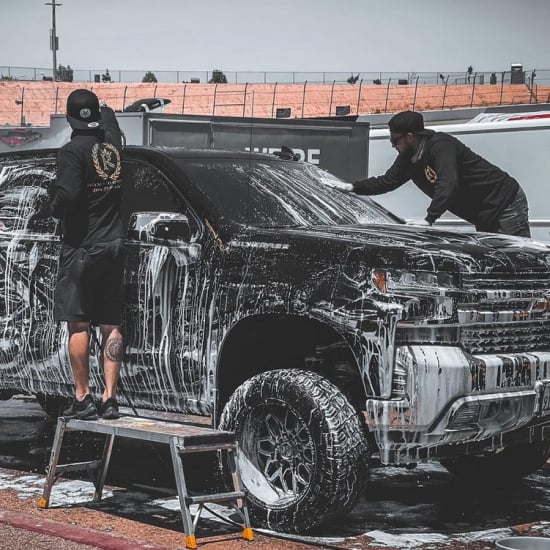Get Superior Vehicle Protection from Detail'd Luxury Detailing & Coatings for Flawless Appeal
Get Superior Vehicle Protection from Detail'd Luxury Detailing & Coatings for Flawless Appeal
Blog Article
A Comprehensive Overview to Ceramic Finish and Its Duty in Car Describing Quality
In the realm of vehicle care and outlining, ceramic layer has actually emerged as a game-changer. This innovative application, a liquid polymer, develops a resilient, hydrophobic surface area that not only safeguards a lorry from environmental harm however also passes on a striking high-gloss surface. This post intends to delve right into the science behind ceramic finishing, its numerous advantages, the application procedure, and succeeding maintenance tips - all contributing to car describing excellence.
Recognizing the Fundamentals of Ceramic Coating
While it may seem complex in the beginning glance, the essentials of ceramic finish are quite simple. Ceramic coating is a fluid polymer that is put on the external surfaces of lorries. This finishing, which bonds chemically with the lorry's manufacturing facility paint, produces a layer of protection. It is renowned for its capability to offer a shiny, top notch coating that is not just visually attractive however also resistant to a selection of prospective problems, consisting of scratches and chips.
Its use is not restricted to automobiles, as it can additionally be applied to various other surfaces, such as metal, plastic, and glass. The application procedure requires a certain level of skill and accuracy and is normally carried out by specialists. This layer's sturdiness relies on several elements, consisting of the top quality of the item and the conditions it is exposed to. In general, understanding ceramic finish is concerning grasping its purpose, application, and advantages.
The Science Behind Ceramic Finishing and Exactly How It Works
Diving right into the science behind ceramic layer, it ends up being obvious that its efficiency results from its distinct chemical homes. The layer is made from a substance called silica dioxide, or SiO2, which develops a bond with the automobile's paint. This bond produces a semi-permanent, difficult layer that safeguards the car's surface area.
The nanotechnology included permits the ceramic bits to fill out the min pores of the auto paint, making the covered surface area hydrophobic, or water repellent. This means that water, dust, and various other pollutants can not follow the surface, rather they bead up and roll off.
Furthermore, the chemical structure of ceramic finish provides it a high warm resistance. This makes it much more durable to the sun's UV rays and stops the car's paint from oxidizing and fading. Comprehending the science behind ceramic layer reveals exactly how this innovative innovation offers a premium level of protection for cars.
Advantages of Applying Ceramic Finishing to Your Car

Ceramic finish additionally enhances an automobile's appearance. It imparts a high-gloss surface that amplifies the vehicle's shade and total visual appeals. This layer is hydrophobic, meaning it pushes back water, making it harder for dirt and grime to stay with the auto's surface area. Therefore, cleansing comes to be a less regular and simpler job.
Lastly, ceramic finish is a sensible financial decision. It is a long-term financial investment that raises a car's resale value by preserving its excellent condition and stunning appearance. Unlike wax or sealant, ceramic finishing does not call for regular reapplication, making it an economical solution.

Step-by-Step Refine of Applying Ceramic Covering
Applying ceramic layer is a careful procedure that requires careful accuracy and interest to information. It starts with a detailed cleansing of the lorry's exterior to eliminate any kind of dirt or grime. This ensures a smooth surface for the coating to follow. The following action entails making use of a clay bar to eliminate any kind of recurring impurities, thus preparing the surface for the application of the coating.
The actual ceramic covering application is done utilizing a little, soft applicator pad. The finishing is used evenly throughout the surface area, panel by panel, in a cross-hatch pattern. This technique makes certain total protection and uniformity. When applied, the covering is allowed to heal. This process can occupy to 24 hr.
This detailed procedure, while time-consuming, is vital to achieving the visual and safety benefits of ceramic layer. It boosts the lorry's look, preserves its value, and ensures its durability.
Keeping Your Vehicle Blog Post Ceramic Finishing: Tips and Techniques
Just how does one make sure the preservation of a ceramic finish's luster and durability? Making sure longevity entails regular mild cleaning look here with pH-neutral soaps that won't weaken the finishing.
It is recommended to dry out the car completely after cleaning to avoid water places, which can possibly damage the layer - Detail'd Luxury Detailing & Coatings. Routinely applying a leading coat sealant can also boost the finishing's resilience and heighten the shiny result
However, the car must not be exposed to heavy rain or various other severe conditions instantly after finish application. The layer needs time to heal properly, typically around 48 to 72 hours.
Conclusion
In verdict, ceramic covering uses an innovative means to boost a car's appearance while giving durable protection against environmental damages. It is an essential element of car outlining quality that boosts resale value and makes certain longevity. By understanding the scientific research, application procedure, and upkeep requirements of ceramic finishing, cars and truck lovers can attain a level of describing that important link truly stands the examination of time.

Ceramic finishing additionally boosts a vehicle's appearance.In verdict, ceramic finishing uses a cutting-edge means to improve a car's look while supplying robust protection against ecological damages. By understanding the science, application procedure, and upkeep demands of ceramic finishing, vehicle lovers can achieve a level of outlining that really stands the test of time.
Report this page